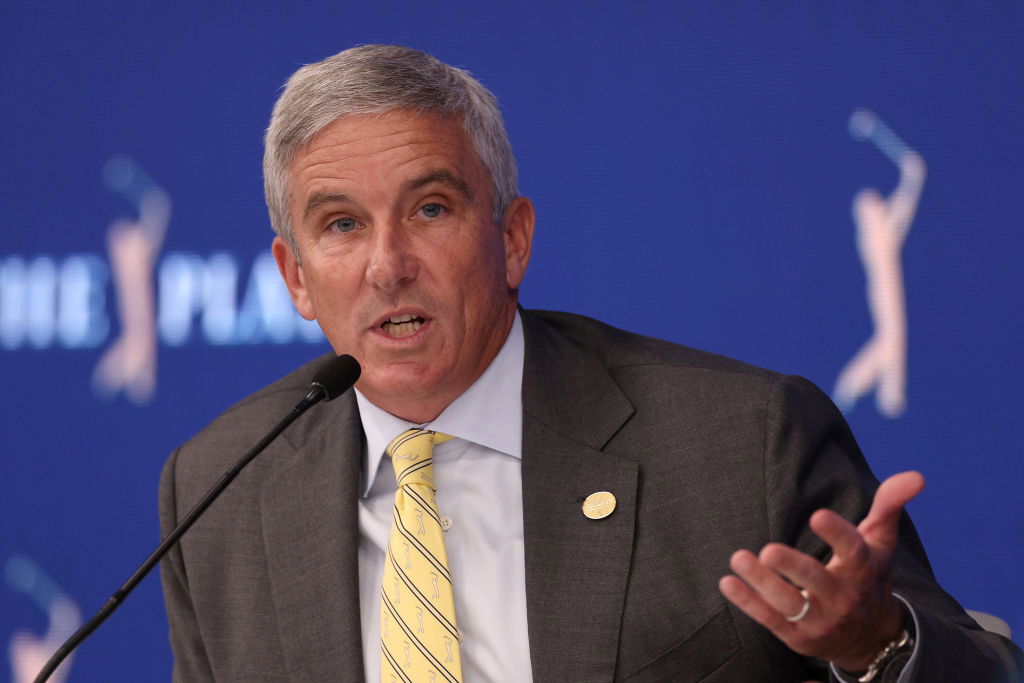
Getty
PONTE VEDRA BEACH, FLORIDA – MARCH 07: Jay Monahan, Commissioner of the PGA Tour speaks to the media in a press conference prior to THE PLAYERS Championship on THE PLAYERS Stadium Course at TPC Sawgrass on March 07, 2023 in Ponte Vedra Beach, Florida. (Photo by Richard Heathcote/Getty Images)

Getty
PONTE VEDRA BEACH, FLORIDA – MARCH 07: Jay Monahan, Commissioner of the PGA Tour speaks to the media in a press conference prior to THE PLAYERS Championship on THE PLAYERS Stadium Course at TPC Sawgrass on March 07, 2023 in Ponte Vedra Beach, Florida. (Photo by Richard Heathcote/Getty Images)
When LIV Golf came onto the scene in 2022, it took the golfing world by storm. The glitz, the money, the drama — it was all very exciting until reality set in. The league lured some of the biggest names on the PGA Tour practically overnight, and according to 7-time PGA Tour winner Peter Jacobsen, that moment marked a costly mistake — not because players left, but because the PGA Tour panicked.
Watch What’s Trending Now!
Joining hosts Ryan French and Mark Baldwin, Jacobsen didn’t mince words when asked about the Tour’s current landscape on the Monday Q Info podcast. And his response came with brutal honesty. “It’s interesting. When LIV Golf came around, the PGA Tour, I think, blinked first,” Jacobsen said. “They started worrying about the players leaving to go to LIV. And that’s a valid concern. I would never criticize anybody for being afraid of that. But I also believe in the organization, the PGA Tour,” he added.
Jacobsen highlighted that instead of the PGA Tour being afraid of what was going to happen and panicking, they should have had more belief in their own system. “If I had been in charge, I would have said, ‘Look, any player that wants to go to LIV, I’ll pay for the Uber. Just go. Just take the money and leave,” Jacobsen continued. “Because we have a very strong organization that was started and founded by players like Nicklaus and Palmer back in ’68, ’69. And the PGA Tour has only gotten bigger, better, and stronger through the participation of players over the years.”
ADVERTISEMENT
It’s a bold statement, but one rooted in Peter Jacobsen’s deep trust in the PGA Tour’s long-term model — one that has thrived for over five decades on meritocracy, tradition, and community impact. His frustration wasn’t aimed at the players who left, but rather at the PGA Tour for not trusting its own roots. “Let’s not forget players come and players go,” he continued, stating that that’s how the tour moves forward. He believes the PGA Tour’s true power lies not in star names but in something far less glamorous as compared to LIV — its communities.
“And I think that the most important thing is to put faith in your organization and put your faith in the game. I’ve always said that the PGA tour is not about the players. The PGA Tour is about the communities where we play and the charities we support,” Jacobsen tells the hosts, that that’s where the PGA Tour holds a massive advantage over LIV. He sees LIV Golf’s guaranteed contracts and massive signing bonuses as a short-term gain that lacks the cultural and competitive backbone that the PGA Tour was built on.
Peter Jacobsen has some great stories from his long career. From accidentally cutting in front of Arnie in his first tour event to meeting Ben Hogan.
And he gives @markbaldwin1 pep talk for Q-school.
AGM sponsored by @drinkdadwater w a legend. pic.twitter.com/IPJGi6mL1A
— Monday Q Info (@acaseofthegolf1) September 17, 2025
ADVERTISEMENT
And Jacobsen’s got a point. Over the decades, PGA Tour events have poured millions into local nonprofits and charitable organizations, constantly giving back to the community that comes out to support them. He points out that regardless of who is playing that week, “those tournaments thrive based on the success of the community and the community support, not any one individual player.” Sure, big names help sell tickets and garner fans, but in Jacobsen’s eyes, they’re not enough to run the show.
This makes the current state of limbo between the PGA Tour and LIV Golf all the more complicated, because for all the talk of “growing the game,” the divide has arguably done the opposite.
ADVERTISEMENT
Top Stories
Ex-Wife Elin Nordegren’s Reaction to Tiger Woods Dating Vanessa Trump Speaks Volumes

Scottie Scheffler’s Caddie Shares Cryptic Message as He Bids Fans ‘Goodbye’

Huge Fire Destroys Over 125-Year-Old Golf Club Designed by 5x Open Winner in London – Report

Tiger Woods’ Warm Moment With Ex-Wife Elin Nordegren Caught on Camera at Son Charlie’s Junior Event

Brooks Koepka’s LIV Golf Exit Explained as Ex-Pro Reveals Brutal Reality

Two Years on, and the LIV-PGA Merger is Yet to Happen
When the PGA Tour and Saudi-backed LIV Golf announced their surprise framework agreement in June 2023, the golfing world was stunned. Promising to unify men’s professional golf under one umbrella, the announcement came suddenly and felt, to many, rushed and vague. Now, nearly two years later, the landscape still remains blurry. Despite countless initiatives, LIV Golf and the PGA Tour continue to operate as separate entities, and top-tier players remain split between the two circuits.
Hopes were briefly reignited in June when the PGA Tour announced Brian Rolapp as its new CEO in June, but even that spark came with its own drama. Behind Rolapp’s appointment, insiders revealed that negotiations with Saudi Arabia’s Public Investment Fund (PIF) had already stalled months earlier. In fact, conversations reportedly stopped entirely by April’s RBC Heritage, and since then, things have only grown quieter.
ADVERTISEMENT
When asked about the merger, Rolapp described it as “a blank sheet of paper,” offering little clarity beyond confirming the complexity of the situation. PGA Tour board member Adam Scott also gave away hope on any near-term optimism, saying, “There have really been no developments… so I would say, don’t hold your breath.” His point? The divide isn’t just operational anymore. Players on each side have made their choices, and unless something major shifts, golf’s great unification may still have a long way to go.
ADVERTISEMENT
ADVERTISEMENT
ADVERTISEMENT

